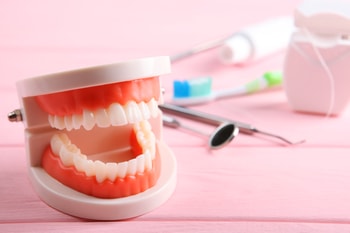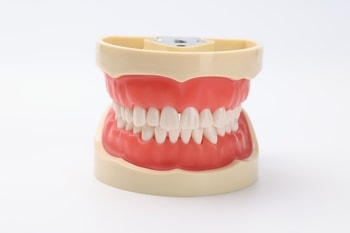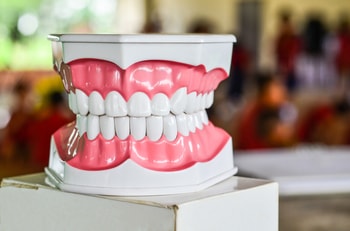Types of Dentures: A Comprehensive Guide to Replacing Missing Teeth
Missing teeth can impact your ability to speak, eat, and smile confidently. Fortunately, modern dentistry offers many solutions to restore your smile and improve your oral health. One of the most common solutions is dentures, which come in various types to cater to different needs. If you’re considering dentures, it’s important to understand the different types available to make the best choice. This guide will cover the various types of dentures, their benefits, and what you can expect while getting them.
What Are Dentures?
Dentures are removable prosthetic devices designed to replace missing teeth and surrounding tissues. They are made to resemble natural teeth and help patients who have lost all or some of their teeth. Dentures restore your ability to eat and speak and improve your facial appearance by supporting the muscles in your face and jaw.
The Different Types of Dentures
There are several types of dentures that can be used to replace missing teeth. These include complete dentures, partial dentures, implant-supported dentures, and more. Let’s take a closer look at each type.
1. Complete Dentures
Complete dentures are used when all teeth are missing. Depending on which teeth need to be replaced, they can be made for both the upper and lower jaw. Full dentures consist of a full set of replacement teeth that sit directly on the gum tissue. These dentures are designed to look and function like natural teeth, providing a natural-looking smile and restoring the ability to chew and speak.
There are two types of complete dentures:
- Conventional Dentures: These are the most common types of complete dentures. They are created after your gums heal post-tooth removal, which can take several weeks or months.
- Immediate Dentures: These are placed in your mouth immediately after tooth removal. They offer the benefit of not going without teeth during the healing process, though they may need to be adjusted as your gums heal and shrink over time.
2. Partial Dentures
When only some of your teeth are missing, partial dentures can fill the gaps. Partial dentures consist of replacement teeth attached to a gum-colored base, often made of acrylic or metal. They are designed to fit snugly around your remaining teeth and can be removed for cleaning. This type of denture is ideal for people with healthy natural teeth but must replace missing teeth in certain areas.
Partial dentures are custom-made to blend in with your existing teeth, providing a natural appearance. They also help prevent the remaining teeth from shifting out of place and preserve oral health.
3. Implant Supported Dentures
 Implant-supported dentures are a more permanent solution for replacing missing teeth. These dentures are secured to dental implants surgically placed into the jawbone. The implants are anchors for the denture to keep it firmly in place. Implant-supported dentures offer several advantages over traditional dentures, including:
Implant-supported dentures are a more permanent solution for replacing missing teeth. These dentures are secured to dental implants surgically placed into the jawbone. The implants are anchors for the denture to keep it firmly in place. Implant-supported dentures offer several advantages over traditional dentures, including:
- Stability: Since implants anchor the dentures, they are much more stable and less likely to slip than removable ones.
- Improved Comfort: These dentures do not rest on your gum tissue, which reduces discomfort and irritation.
- Better Functionality: Implant-supported dentures provide a more natural chewing experience, allowing you to eat a wider variety of foods.
- Bone Preservation: Dental implants help stimulate the jawbone, preventing bone loss that often occurs after tooth loss.
4. Snap-In Dentures
Snap-in dentures are another option combining the benefits of removable and implant-supported dentures. They are secured in place by dental implants, but they can be removed for cleaning. Snap-in dentures provide more stability and a better fit than traditional removable dentures, offering a more comfortable experience. They are ideal for people who want the stability of implants but still prefer the ability to remove their dentures when necessary.
5. Flexible Dentures
Flexible dentures are removable dentures made from a softer, more flexible material, such as nylon. These dentures are designed to be more comfortable and natural-looking than traditional acrylic dentures. The flexible material allows the dentures to bend slightly, making them more breakage-resistant. They are ideal for people who want a comfortable, lightweight denture that blends in with their remaining teeth.
These dentures are also a good option for individuals with sensitive gums or unsuitable candidates for implant-supported dentures.
6. Removable Partial Dentures
A removable partial denture is a type of partial denture that can be taken out of your mouth for cleaning and maintenance. These dentures are used when a few teeth are missing, but you still have remaining natural teeth. Removable partial dentures are often made of acrylic or metal and are custom-designed to fit comfortably around your remaining teeth. They are more affordable than implant-supported dentures but may not provide as much stability.
7. Custom Dentures
Custom dentures are made to fit your mouth perfectly. Unlike mass-produced stock dentures, which come in standard sizes, custom dentures are tailored to your mouth, ensuring the best fit and comfort. These dentures are ideal for individuals who want a more personalized solution for replacing missing teeth. They are crafted using acrylic resin or other materials that closely resemble natural teeth, providing a natural-looking smile.
Advantages and Disadvantages of Different Types of Dentures
 Each type of denture has its own set of benefits and drawbacks. Here’s a comparison to help you understand which option might be best for your needs.
Each type of denture has its own set of benefits and drawbacks. Here’s a comparison to help you understand which option might be best for your needs.
Complete Dentures:
- Advantages: Great for those who have lost teeth; affordable; improves appearance and functionality.
- Disadvantages: It can be uncomfortable initially; it may require adjustments over time as your gums heal.
Partial Dentures:
- Advantages: It is ideal for those who still have some natural teeth, is more affordable than implants, and prevents the shifting of remaining teeth.
- Disadvantages: They may not feel as secure as implants, can be harder to clean, and may need to be replaced after several years.
Implant-Supported Dentures:
- Advantages: Stable and secure; prevents bone loss; more comfortable; longer-lasting.
- Disadvantages: More expensive; requires surgery and healing time.
Snap-In Dentures:
- Advantages: More stable than traditional dentures; removable for cleaning; easier to wear than complete dentures.
- Disadvantages: Requires implant surgery; more expensive than removable dentures.
Flexible Dentures:
- Advantages: Comfortable and lightweight; more durable than traditional dentures; ideal for people with sensitive gums.
- Disadvantages: More expensive than acrylic dentures; may not offer as much stability as implant-supported dentures.
Removable Partial Dentures:
- Advantages: They can be removed for cleaning, making them ideal for people with remaining natural teeth and more affordable than implants.
- Disadvantages: It may be uncomfortable and requires proper care to avoid gum irritation.
Custom Dentures:
- Advantages: Better fit and comfort; more natural looking than stock dentures.
- Disadvantages: More expensive; may take longer to make.
Caring for Your Dentures
Proper care is essential to ensure your dentures stay comfortable, functional, and long-lasting. Whether you wear permanent dentures, removable dentures, or any other type, the right maintenance can help you avoid discomfort, irritation, or even damage to the dentures themselves. Taking good care of your dental implants or partial dentures is just as important to keep your oral health in check.
Here are some tips for caring for permanent dentures and other types of dentures effectively:
1. Clean Your Dentures Carefully
Proper cleaning is crucial no matter the type of denture you wear. Permanent and removable dentures can accumulate food particles, plaque, and bacteria, leading to oral infections and bad breath. Cleaning your dentures properly will help maintain both your gum tissue and dentures.
- Use a gentle cleanser: Regular toothpaste can be too abrasive for dentures and might scratch the surface. Opt for a denture cleaner or mild soap and water to clean your dentures. These specialized cleansers are designed to effectively remove food particles and bacteria without harming the artificial teeth.
- Brush your dentures with a soft-bristled brush daily to remove plaque and any remaining food particles. Remember to brush the inside of your denture and the gum line to maintain hygiene.
- Soak your dentures overnight: Place them in water or a denture solution overnight to prevent drying out and warping. This helps maintain their shape, especially for removable dentures. If you’re wearing permanent dentures, cleaning them daily and rinse them properly is still important.
2. Store Your Dentures Properly
When you’re not wearing dentures, it’s important to store them correctly. Permanent dentures don’t require the same care as removable ones, but they must be handled carefully. Properly storing your dentures can lead to cracks, warping, or staining.
- When not in use, store removable dentures in a safe, secure container filled with water or a cleaning solution. Avoid leaving them in places where they could fall or get damaged.
- While permanent dentures are fixed in place, it’s still essential to maintain the surrounding tissues and gum health. Keep up with routine check-ups to ensure the dental function is intact.
3. Use Denture Adhesive When Needed
Some people use denture adhesive to help improve the fit and comfort of their removable dentures. Denture adhesive helps hold the dentures in place, especially for those who experience a poor fit or discomfort while wearing dentures. It can provide extra confidence, especially when eating or speaking.
- Apply a small amount of denture adhesive to the base of your removable dentures before inserting them. Be sure to follow the instructions on the adhesive packaging, as using too much can cause discomfort or make it harder to clean your dentures.
- For permanent dentures, denture adhesive is usually unnecessary since they are securely anchored in your mouth. However, if you’re experiencing shifting or discomfort, consult your dentist, as it could indicate a problem with the fit.
4. Regular Check-Ups
Even if you wear or have permanent dentures, visiting your dentist regularly is crucial. Over time, your gum tissue can change shape due to bone loss or natural shifts in the structure of your mouth. Regular appointments allow your dentist to adjust your dentures or implants to ensure they fit well and serve their purpose effectively.
- During your dental visit, ask your dentist to check for gum irritation or damage to your denture adhesive if you’re using it. Your dentist can also help monitor the health of the remaining natural teeth or bone tissue supporting your dentures, which is especially important if you have implant-supported dentures.
- If you notice any discomfort or difficulty wearing dentures, or if your dentures feel loose or unstable, it’s essential to consult your dentist. These issues can typically be resolved quickly with adjustments or even a new set of dentures if needed.
5. Handle Dentures Gently
Whether you’re wearing dentures temporarily or using them long-term, handling them carefully is essential to avoid damaging or breaking them. Permanent dentures may be fixed in place, but removable dentures are more fragile and should be treated gently.
- When cleaning or handling your removable dentures, avoid dropping them. A drop from a significant height could cause cracking or breakage. To minimize the risk of damage, it’s always a good idea to clean them over a soft surface, like a towel or a sink filled with water.
- If you use denture adhesive, check that it is properly cleaned off the dentures each time you remove them. Excess adhesive can affect the fit and cause discomfort.
6. Maintain Your Oral Health
 Good oral health is vital even if you wear dentures. For permanent dentures, your dentist will continue monitoring your gums, the remaining natural teeth, and overall oral health. For removable dentures, it’s still important to maintain healthy gum tissue and the surrounding tissues to ensure your dentures fit properly.
Good oral health is vital even if you wear dentures. For permanent dentures, your dentist will continue monitoring your gums, the remaining natural teeth, and overall oral health. For removable dentures, it’s still important to maintain healthy gum tissue and the surrounding tissues to ensure your dentures fit properly.
- Brush your natural teeth and gums thoroughly, even if you only have a few remaining teeth. Your dentist may recommend using a soft toothbrush to avoid irritating your gums and to keep your mouth fresh.
- If you have implant-supported dentures or partial dentures, your dentist will guide you on how to clean your implants or natural teeth that support the dentures. These areas require special attention to avoid complications like gum disease or tooth decay.
Conclusion
Choosing the right types of dentures is a personal decision that depends on your individual needs and preferences. Whether you opt for complete dentures, partial dentures, implant-supported dentures, or flexible dentures, the goal is to restore your ability to eat, speak, and smile confidently. By understanding the options available, you can make an informed choice that best suits your oral health needs and lifestyle. Always consult a professional dentist to help guide you toward the right solution for replacing missing teeth and maintaining optimal oral health.
References
https://www.webmd.com/oral-health/dental-health-dentures
https://www.polident.com/en-us/full-dentures/denture-care/types-of-dentures/
https://my.clevelandclinic.org/health/treatments/10900-dentures

